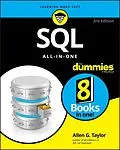The latest on SQL databases
SQL All -In-One For Dummies, 3rd Edition, is a one-stop shop for everything you need to know about SQL and SQL-based relational databases. Everyone from database administrators to application programmers and the people who manage them will find clear, concise explanations of the SQL language and its many powerful applications.
With the ballooning amount of data out there, more and more businesses, large and small, are moving from spreadsheets to SQL databases like Access, Microsoft SQL Server, Oracle databases, MySQL, and PostgreSQL. This compendium of information covers designing, developing, and maintaining these databases.
* Cope with any issue that arises in SQL database creation and management
* Get current on the newest SQL updates and capabilities
* Reference information on querying SQL-based databases in the SQL language
* Understand relational databases and their importance to today's organizations
SQL All-In-One For Dummies is a timely update to the popular reference for readers who want detailed information about SQL databases and queries.
Autorentext
Allen G. Taylor is a 40-year veteran of the computer industry and the author of more than 40 books, including SQL For Dummies and Database Development For Dummies. For the latest news on Allen's activities, check out his online courses (at pioneer-academy1.teachable.com) and his blog (at www.allengtaylor.com). You can contact Allen at allen.taylor@ieee.org.
Klappentext
Your complete guide to SQL
SQL is the internationally recognized standard language for dealing with data in relational databases. So whether you're a database administrator, a programmer, or someone who manages those functions, this handy one-stop guide belongs on your shelf! It covers SQL basics, the latest upgrades, database development, security, SQL with XML, and much more.
8 Books Inside
- SQL Concepts
- Relational Database Development
- SQL Queries
- Data Security
- SQL and Programming
- SQL, XML, and JSON
- Database Tuning Overview
- Reserved Words and Glossary
Zusammenfassung
The latest on SQL databases
SQL All -In-One For Dummies, 3rd Edition, is a one-stop shop for everything you need to know about SQL and SQL-based relational databases. Everyone from database administrators to application programmers and the people who manage them will find clear, concise explanations of the SQL language and its many powerful applications.
With the ballooning amount of data out there, more and more businesses, large and small, are moving from spreadsheets to SQL databases like Access, Microsoft SQL Server, Oracle databases, MySQL, and PostgreSQL. This compendium of information covers designing, developing, and maintaining these databases.
- Cope with any issue that arises in SQL database creation and management
- Get current on the newest SQL updates and capabilities
- Reference information on querying SQL-based databases in the SQL language
- Understand relational databases and their importance to today's organizations
SQL All-In-One For Dummies is a timely update to the popular reference for readers who want detailed information about SQL databases and queries.
Inhalt
Introduction 1
About This Book 1
Foolish Assumptions 2
Conventions Used in This Book 3
What You Don't Have to Read 3
How This Book is Organized 3
Book 1: SQL Concepts 3
Book 2: Relational Database Development 4
Book 3: SQL Queries 4
Book 4: Data Security 4
Book 5: SQL and Programming 5
Book 6: SQL and XML 5
Book 7: Database Tuning Overview 5
Book 8: Appendices 5
Icons Used in This Book 6
Where to Go from Here 6
Book 1: SQL Concepts 9
Chapter 1: Understanding Relational Databases 11
Understanding Why Today's Databases are Better than Early Databases 12
Databases, Queries, and Database Applications 16
Examining Competing Database Models 18
Why the Relational Model Won 29
Chapter 2: Modeling a System 31
Capturing the Users' Data Model 31
Translating the Users' Data Model to a Formal Entity-Relationship Model 34
Entity-Relationship modeling techniques 35
Chapter 3: Getting to Know SQL 55
Where SQL Came From 55
Knowing What SQL Does 56
The ISO/IEC SQL Standard 57
Knowing What SQL Does Not Do 57
Choosing and Using an Available DBMS Implementation 58
Chapter 4: SQL and the Relational Model 67
Sets, Relations, Multisets, and Tables 68
Functional Dependencies 69
Keys 70
Views 71
Users 72
Privileges 72
Schemas 73
Catalogs 74
Connections, Sessions, and Transactions 74
Routines 75
Paths 75
Chapter 5: Knowing the Major Components of SQL 77
Creating a Database with the Data Definition Language 77
Operating on Data with the Data Manipulation Language (DML) 88
Maintaining Security in the Data Control Language (DCL) 97
Chapter 6: Drilling Down to the SQL Nitty-Gritty 99
Executing SQL Statements 99
Module language 104
Using Reserved Words Correctly 105
SQL's Data Types 105
Handling Null Values 123
Applying Constraints 124
Book 2: Relational Database Development 131
Chapter 1: System Development Overview 133
The Components of a Database System 133
The System Development Life Cycle 136
Chapter 2: Building a Database Model 149
Finding and Listening to Interested Parties 150
Building Consensus 152
Building a Relational Model 154
Being Aware of the Danger of Anomalies 157
The Database Integrity versus Performance Tradeoff 164
Chapter 3: Balancing Performance and Correctness 167
Designing a Sample Database 168
Maintaining Integrity 179
Avoiding Data Corruption 183
Speeding Data Retrievals 185
Working with Indexes 187
Reading SQL Server Execution Plans 194
Chapter 4: Creating a Database with SQL 199
First Things First: Planning Your Database 199
Building Tables 200
Setting Constraints 204
Keys and Indexes 205
Ensuring Data Validity with Domains 205
Establishing Relationships between Tables 206
Altering Table Structure 210
Deleting Tables 210
Book 3: SQL Queries 211
Chapter 1: Values, Variables, Functions, and Expressions 213
Entering Data Values 213
Working with Functions 217
U...
